
Vol. 1, No. 31 Published by India China Division, Air Transport Command August 16, 1945

|
Receipt of Jap Surrender
To Tense World Audience
Nipponese Accept Terms, No Qualifications;
MacArthur Takes Over
The war is over! The news for which the world had been waiting for days, from the start of surrender negotiations with Japan, finally broke upon a tense audience Wednesday.
Official announcement to U.S. troops was made by Pres. Truman who reported that Japan's acceptance of surrender terms "without qualifications" had been received in Washington. Radio announcement also was made by Prime Minister Atlee.
Final word put the official stamp on what the world already knew - that Japan was beaten and was ready to lay down its arms. If it took any persuasion to force Japan to make up its mind, that "persuader" was a fleet of 800 Superforts and hundreds of smaller planes which loosed a rain of bombs on the island Tuesday as Tokyo's reply to terms was awaited.
Through Swiss
Final negotiations for surrender began last Saturday when the Allies sent to Japan the terms which they would accept, including rule of the island empire by the Supreme Allied Commander, through the Emperor who would be allowed to retain his throne.
Replies and counter-replies passed through the Swiss government and the Swiss delegation delivered Japan's acceptance to the State Department.
Gen. MacArthur, according to Army News Service, was moving into Japan to assume command. It was reported by the United Press that the U.S. has completed a directive outlining the stern policy to govern immediate military occupation of the country.
Just before the final word came the world's mightiest naval force was poised for an all-out smash against the Jap empire; thousands of land and carrier-based planes were awaiting orders to drop their devastation; Chinese troops still were pursuing Japanese forces up the Kan River Valley in China; Marshal Malinovsky's Transbaikal army was driving through the Khingan range into Manchuria at Miantuho, and Marshal Meretskov's First Far Eastern army had taken Linkow.
Jap Announcement
Under surrender terms Japan was to command all military, naval and air authorities and all forces under their control, wherever located, to cease active operations and surrender their arms. They also were to issue such orders as the supreme commander may require.
At 2:49 p.m. (Japanese time) Tuesday the Tokyo radio announced that official surrender would be broadcast shortly, approximately 90 hours after issuance of the United Nations ultimatum. Announcement was made by Pres. Truman at 7 p.m. (EST) Tuesday.
Now? Now! Lid Blows Off As World Welcomes Finish
News of the Japanese surrender stunned an already shocked world into only momentary awe after which a people, long sobered by war's seriousness, manifested their varied feelings in tumultuous demonstrations.
On Okinawa, where men are used to expressing their feelings with force, at least six men were killed and 30 injured last Friday night by falling anti-aircraft shell fragments and bullets. To celebrate, soldiers staged a spectacular display of rockets, ack ack, and flares. The half-hour display came to an end only when island commanders ordered an air raid alert and then warned the men, by radio, to cease firing.
Confetti Display
Closer to the paper war, New York people sent a modest 380 tons of torn paper into Manhattan streets. "Butch" LaGuardia, always alert and quotable, "scented a Jap trick." Radios blared throughout Friday night and arguments were kicked around on street corners and in homes, offices and bars.
The most enthusiastic reaction came from returning veterans of the European war. In Times Square windows were barricaded and police stood ready for a possible wild celebration, but by Saturday New York had quieted down.
A quickly-withdrawn erroneous United Press news flash that Japan had accepted the Allies' terms, Sunday night, touched off a series of uproarious, premature peace celebrations.
Reconversion
Crowds gathered around the White House and cheered. New York's harbor sent up a resounding fanfare from boats' sirens and whistles. Despite the fact that UP killed the flash within two minutes, celebrations did not cease for hours in some cities.
In some more accurate reporting, UP hit a new high in recording the people's reaction. One of its reporters found a "victory girl" - so-called because of her good will toward servicemen - who confided, "Well, I guess it's a civilian life for me. Reconversion, here I come."
Chinese Hoped
It wasn't safe at the movies in Kunming. Fliers who had fingered guns for months finally got a chance to use them - and didn't pass it up. The explosive demonstration lasted well into the night, with vodka adding its punch.
After eight years of war the Chinese people saw a chance of peace, and were thankful.
|
A good deal of life was added to an already fast-moving party Kurmitola GIs had staged at Dacca, India, when news of the approaching end of the war hit it. Calcutta was almost shocked into keeping its bars open an extra five minutes. Soldiers of all nations and civilians gathered everywhere to discuss the startling developments and to celebrate.
A Delhi-based GI, a fugitive from a city room, decided to announce the news to Delhi citizens through their most revered medium - a bovine. In huge letters he painted the message on the flank of a white bullock.
In Tokyo - the cabinet met.
Reduction to 3,000,000 Men Believed To Be Army Plan
Washington (ANS) - The Army has a V-J plan for demobilization, the details of which are top secret, but informed sources, quoted by the Associated Press, figure on reduction to 3,000,000 men.
Official speculation was that after V-J day, demobilization will be stepped up, but that no wide-scale discharges will take place until the Japanese homeland and islands formerly Japanese-held have been occupied.
Release 500,000
In other words, the Army will take no chances on the failure of any Japanese to comply with the surrender. An army of about 2,000,000 will have to be disarmed in the home islands alone. In the meantime the Army probably will make every effort to release promptly approximately 500,000 men who are eligible under the point system, according to the Associated Press.
The Army also is expected to make a substantial reduction in critical points needed for discharge. Possibly 2,000,000 men will receive point-score discharges, leaving a force of about 6,000,000 men.
If all goes well in the initial phases of occupying Japanese territory, informed sources believe that half or more of that number can be discharged within a year.
400,000 in Germany
The remainder would form occupation forces in Germany and Japanese areas, man outpost garrisons in Alaska and elsewhere, keep supply chains moving and provide a reserve in the U.S.
At present the occupation force in Germany is fixed at 400,000 and military experts estimate it will take at least twice that number to occupy Japan. The eventual size of a peacetime Army still has to be fixed by Congress.
Time Abroad, Essentiality To Rule Release
General Tells What Lies Ahead for Men of ICD
Hq., Calcutta - Essentiality of a man's job and his time overseas will be the chief factors which govern his return to the States from ICD, Brig. Gen. Tunner revealed Wednesday on the basis of information currently available.
In an attempt to answer the question uppermost in the mind of every man in the division - "When do I go home?" - the general pointed out it will be ICD's job to carry the thousands of Americans in India, Burma and China to points of embarkation and to continue to fly the Hump "chiefly with subsidence for Americans still in China."
Work Heads Cut
Among changes in policy, forecast by the general for war's end was a lessening of pressure. He said flying would be restricted, as far as possible, to good weather, daylight operation and generally safe conditions. All officers and men will be encouraged to take advantage of rest, rehabilitation and jungle camps, and opportunities for education, entertainment and recreation are scheduled to increase, his statement added. Sections concerned have set to work to increase these facilities.
Gen. Tunner said "excessive work loads will be reduced to a minimum, but every man will be expected to do a fully productive job during his assigned duty hours," and he added that there would be no relaxation of military courtesy and discipline. The general stated:
"As much as I would like to send you all home immediately, you will realize that this is not possible. Neither available transportation nor our job permits it."
Alluding to the job ahead he said, "Well-planned and well-handled, it should not be too difficult or too long an assignment." He promised that any changes in policy or plan would be reported to the men promptly through COs. Meanwhile, he called upon personnel to "maintain the same high standards that have marked your performance and behavior throughout the war."
Essentiality Prime Factor
Scotching rumors that promotions would halt with the end of the fighting, the personnel section announced that no such information has been received from Washington. It was explained that men enlist, are drafted and commissioned for the duration of the emergency - not just for the war. Likewise, the current progress on rotation and 45-day TDY also will continue until ATC or the War Department orders a change.
No official word has been received by A-1 concerning the possibility of obtaining a discharge in CBI to allow travel in foreign countries before returning home.
As far as possible the men who have served the greatest length of time overseas will be sent home first, but their essentiality will be a prime governing factor. A WD critical MOS list affecting a relatively small number of men, prohibits returning soldiers in certain categories. For those with a non-critical MOS, the chief factor will be importance of the man in his job and the essentiality of the job to the command.
|
Merits of Every-Day Jobs
1354 BU, China - Every war brings its tales of heroic achievements on the battlefields, of exciting dogfights high in the skies, of glorious deeds of men who win medals and leave memories.
This is not such a story. It is the saga of the every-day life of a small group of GIs caught in the backwash in the final stages of this war.
Located at "the end of the line," the men here jokingly remark that any step they take in any direction would be getting them closer to their homes. Geographically speaking, they are not exaggerating.
Snow-Laden Tents
For five long months the men lived in snow-laden tents, hunched over open charcoal fires to warm their frostbitten hands. Snow melted in helmets furnished water for washing and shaving, but it wasn't scarcity of water that resulted in many a beard on 1354 GIs. Lack of recreation of any type - no movies, no shows, no women - wasn't conducive to keeping up appearances. The men still talk about their big, and only, entertainment last year - a variety show by an ATC troupe on Christmas Eve, staged in the mess hall.
Now that summer has come to China, the men feel they are living in the "lap of luxury." More comfortably located in permanent housing, their only worries now are the daily blistering temperatures, sand flies, cholera epidemic, whirling dust and the other details of a soldier's life when he's miles away from home.
No Headlines
There are no heroic jobs performed by any of the men - just routine work on 12-hour shifts. There are no ceremonies with medals awarded, no letters of commendation. There have been no raids on this base, no dangerous meetings with the Japanese that the men can recall when the war is over. The closest these GIs have come to actual war was last winter when they spent long, cold hours in slit trenches during alerts. But no enemy bombs were dropped.
No headlines will be made by 1354 men; their work will not make tales of meritorious achievement. But they will have other memories. Throughout all the humdrum days of monotonous routine and meager life, these GIs have handled cargo and shipped Chinese troops from the area, helping pull China through her darkest days since 1937.
'Hangover Square' Features
Stateside Bar, Terrace Room
1304 BU, Barrackpore, India - "Hangover Square," Barrackpore's modernistic night club, opened its doors the other day.
The new club, built by GIs for GIs, is one of the finest in India, say nitery connoisseurs.
The Esquire room, so named because of the pictures adorning the walls, is a refreshment room, serving sandwiches - a mecca for small parties. The American Beauty room is the cocktail lounge, spacious and quiet.
Adjoining these rooms is the Palm room in which stands the 40-foot bar.
|
The most beautiful of the club's installations is the Marine terrace, designed by Sgt. George McManus. The Marine terrace is an outdoor structure resembling a ship's bow. In the bow's forward section is the bandstand and stretching before the stand is the dance floor, with tables and chairs arranged cabaret-style.
Plans for Hangover Square include frequent floorshows by GI and civilian entertainers. The club was completed through the efforts of special services and the electric and carpenter shops.
Point System Release Final
No GIs To Be Recalled, War Department States
Washington (ANS) - Soldiers discharged under the point system will not be called for further service unless as volunteers, according to the War Department.
Outlining policy on re-induction, WD also said officers released under honorable conditions would be placed on inactive status, subject to recall if their services were needed. In that status they are not liable to selective service induction.
Officers and enlisted men discharged under conditions other than honorable would be separated completely from military service, placed under the direction of selective service but eligible for induction only if the War Department grants a waiver of other than honorable discharge. Enlisted men discharged for physical disability, dependency, of for national interest may be re-inducted if conditions under which they are released change subsequently. Consideration would be given to length of prior service.
The department stated: "It is not the desire or intent of selective service or the War Department to re-induct former members of the armed forces who have given long and honorable service, unless they volunteer for further service."
Jinx on Air Supply Brings Two Mishaps, Two 'Issue' Doors
1343 BU, China - Air supply moved into a new warehouse recently, but a few individuals are doing their darnedest to move again.
The unit barely had time to settle down in its new quarters when the first mishap occurred. A jeep drove through the "issue" door, destroying a corner of the building and one of the double doors. Damage immediately was repaired by engineers.
Shortly afterward a six-by-six truck crashed through the warehouse in another spot, scattering mud bricks and leaving a gaping hole in the building. At present their are two "issue" doors, and although GIs seem to get faster service, personnel are of the opinion that they can operate more efficiently with only one.
Air supply is considering putting the building on wheels so it can be shoved aside when destruction-bent vehicles approach.
Ever Bit by Dead Bee? Ask M/Sgt. Gallagher!
1326 BU, Lalmanir Hat, India - It was a bee full of vigor and venom that stung M/Sgt. Robert Gallagher smack dab below the left eye.
Since it happened on the evening of a squadron party, the Tennessee line chief's closed and discolored orb, now blown up to epic proportions, became the target of numerous queries and jests.
Prolonged explanation did no good. None would believe the true story of how it actually happened. At long last inspiration seized him. On a file card which he hung around his neck he wrote Walter Brennan's famous line: "Was you ever bit by a dead bee?"
That did it!
Swinging Sergeant
1351 BU, Kurmitola, India - Bengal wing headquarters CQs are letting S/Sgt. John O'Brien get plenty of sleep these nights. Awakened in the middle of a nightmare recently, O'Brien came up swinging and caught the astonished CQ with a hard-hitting right to the jaw. Next day a memo was added to office instructions - for CQs to "practice extreme caution" when waking Sgt. O'Brien at night.
|
Up-to-Date Chinese Medics
Struggle To Raise 30-Year
Life Span of Countrymen
Introduction of Scientific System Revolutionizes Medicine
(Ed. - This is the first in a series of articles about China, contributed by various Chinese writers.)
By Chiu Sin-Ming
Medicine has long been in existence in China but is still undeveloped.
Through many thousands of years the Chinese people have struggled over so many hardships for their living, and fighting diseases that the general health of the nation has deteriorated. The life span of the Chinese is much shorter than the American, whose longevity is about 63, while that of the Chinese is only 30.
Public Health
Until 1939, nobody seemed to take any heed of the serious problems of how to prolong that most precious thing, life. A majority of the people, even now, is entertaining the idea of the magic cures of the hero doctors.
It was just two years after the start of the war with Japan that China began a more scientific system of public health. It was the beginning of a revolution to medical circles. It was the introduction of the idea of state medicine into this country by the National Health Administration, the gist of which was to extend organized medicine and public health to every corner of the country.
Education's Authorities
The administration hoped to have as many health centers as there were post offices. These health centers are directly under the control of the Provincial Public Health Department and each of them has a small hospital with a score of beds, one to three doctors, one or two nurses and a pharmacist.
The educational authorities have tried to din into medical students that their responsibilities are to promote medical education and bolster the whole nation's health.
798 Centers
So, since 1940, all national medical colleges have adopted the "kung yi" or "public doctor" system, every student being supplied food, lodgings and all other necessities. The idea is to take a six year course and then service with the government for 12 years.
In the 798 health centers China now has, the present generation of medical men are fighting their way to bring longevity to their fellowmen. Through these years of what many diseases have spread, but they were extinguished one-by-one by the indomitable patience of China's health revolutionists.
They Do It All the Time in Kansas City, Says 'Quick-Snack'
1307 BU, New Delhi - Rivaling the recently-publicized Stateside GI who is trying to eat his way out of the Army, "Quick-Snack" Vespestad is the sideshow of the mess hall here and the fair-haired boy of the mess sergeant as he downs plate after plate of C-rations.
In high gear recently, the fat boy filled a plate with a dozen pieces of chicken (GIs don't know how he managed it!) six different vegetables, five slices of bread and a bowl of jello.
Then he left the mess hall. But in 15 minutes he was back, to concentrate on potatoes and gravy and five or six more pieces of chicken. There was a small tub of jello left as the mess hall was closing, so "Quick-Snack" polished that off, too.
Stoutly denying that his appetite is unusual, the mess hall freak says, "Hell, we eat like that all the time in Kansas City."
XNEW, 'Lantern' Cited for Bringing News to Field Troops
Kunming, China - Two Army-operated news agencies, radio station XNEW and the China Lantern, were cited last week by Lt. Gen. A. C. Wedemeyer, China Theater commander, for outstanding service in "getting the news to the troops in the field."
A special message from the theater commander was read over XNEW at noon Thursday by Maj. Gen. H. S. Aurand, commanding general of SOS in China. Gen. Wedemeyer also congratulated the staff of the China Lantern for winning the grand prize in the CNS army paper contest.
Praising the new broadcasting schedule recently adopted by XNEW, Gen. Wedemeyer said the station had been on an 18-hour day since July 29. News broadcasts are heard every hour on the hour and soldiers serving in China are now able to hear the best features of the four major networks. These programs are presented approximately the same hour as back in the United States.
Lt. Ausley C. Roberts, officer in charge of the station, and Lt. Harry D. Purcell, managing editor of the China Lantern, thanked Gen. Wedemeyer on behalf of the staffs.
Inspectoscope 'Sees' Inside of Packages
'MP with X-Ray Eyes' Watches Parcels to States
New York (ANS) - A mechanical MP with X-ray eyes was unveiled by the Army recently to discourage GIs who plan to send home everything but the kitchen sink. Called the "Inspectoscope," it makes it unnecessary for the Army to open all the 3,500,000 packages received from overseas monthly in New York and San Francisco post offices.
Maj. Walter S. Palmer, of the provost marshal general's office, said approximately 30 percent of packages received contain non-mailable government property which is confiscated if there is evidence of theft, the evidence being reported to the Army command having jurisdiction over the sender.
T-Shaped Device
The inspectoscope turned up series of jeep parts which one enterprising GI hoped to assemble after he returned home. Knives, welding equipment, guns and the usual GI souvenirs show up in the T-shaped device which is like a doctor's fluoroscope.
According to Maj. Palmer, one package contained "enough equipment to outfit a dentist's chair." He said the machine unintentionally worked havoc with another package, ruining 60 rolls of unexposed camera film.
War Trophies
To examine a package without opening it, operators place it between the X-ray eye and a lead impregnated screen upon which detecting rays cast the shadow of any metal parts. A group of three men operates the machine in 20-minute shifts. The operator signals the presence of "contraband" to men outside, and the package is then opened. Solids appear on a viewing screen in shadowy outline, but the operators get so they can call pieces almost without having to open packages.
"War trophies are permitted to enter the country if they are captured enemy equipment and have been certified as such," Maj. Palmer said.
Top Leaders Meet As Tension Mounts Among China Forces
Chungking (ANS) - Chiang Kai-shek, Lt. Gen. Albert C. Wedemeyer and Ambassador Hurley conferred again Monday as tension between the Chungking government and Chinese communists increased, Associated Press reported. The three leaders had met the night before amid indications that plans are underway for rapid re-occupation of Japanese-held China.
China's Premier Soong and his foreign minister are currently in Moscow, where they are believed to be seeking clarification of Russia's attitude toward Chinese communists.
Gravity of the situation arises from the order Aug. 10 of the communist commander to his forces to disarm.
Bomb Fuse Explodes, Injures 15 Chinese
1339 BU, China - Removal to a nearby village of an M-3 bomb fuse, which subsequently exploded, recently resulted in injury to 15 Chinese men, women and children.
Several of the Chinese civilians were badly wounded, while others received only slight scratches. They were carried to the base dispensary for first-aid treatment.
Children are believed to have carried the fuse into the village, thinking it to be some plaything. The explosion resulted from repeated tampering with the tube.
Search for 'Aching Back' Treatment Gets Lt. in Jam
1306 BU, Karachi - A lieutenant who suffers from an occasional backache as a result of a fall from a horse several years ago, reported to the nearby hospital for a heat treatment recently.
After asking the way to "Physiotherapy," the lieutenant entered the building indicated and helpful ward boys hustled him into an office. Several minutes passed. The lieutenant was unbuttoning his shirt for the treatment when a medical officer walked in.
Doubted Sanity
The doctor smiled at the patient, and the patient smiled back. The doctor circled him, paused, then
|
That slap hurt, and the lieutenant yelled. The doctor yelled back. This stumped the lieutenant, but it was only the beginning. From the maze of meaningless questions, gestures and exercises that followed, the officer began to doubt his sanity - then he gathered that was just what the doctor had in mind.
He tried to explain that all he wanted was a treatment for his "aching back." This interested the doctor, and the lieutenant elaborated as the medical officer made notes.
'Delusions' He Said
Hours later, long after he had given up trying to get a heat treatment, the lieutenant was given a report and allowed to leave. According to the report, he was suffering from delusions of an "aching back" and should be reminded frequently that the war wasn't so tough and he never had it so good before, or words to that effect.
Seems the physiotherapy and psychiatric wards are in the same building.
Pup Has Triplets 12,000 Feet in Air on Routine Flight
1339 BU, China - There's a time and place for everything, but sometimes nature won't wait. Cpl. Frank H. O'Connor, Grantwood, N.J., radio operator, tells this one - when nature was really in a hurry.
On a recent routine flight from this base to Chengtu, one of the passengers was a fluffy little dog, mascot of the crew, which came over with the boys from Uncle Sugar. She pattered up and down the aisle, the plane soared to 12,000 feet, and the group marked this one down as another trip without incident.
Then there was a soft whine, followed by a weak wimper, from the tail of the ship. The boys investigated and found their mascot about to become a mother. A medical officer on board was summoned, and the worried crew hovered anxiously while their dog gave birth to three small puppies. The last one was born just as the wheels hit the runway at Chengtu.
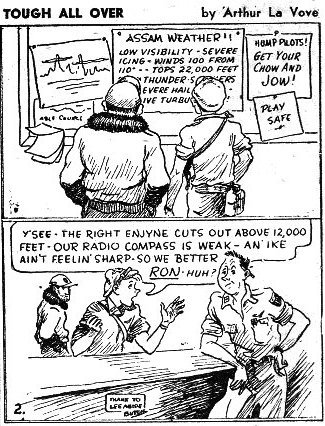
|

The War Is Over
The war is over. The fighting has stopped. Japan has given up.
The news which the entire world has awaited breathlessly since the negotiations began days ago portends developments which mean much to everyone in ICD.
The story on the first page tells what the command's adjustment to final cessation of hostilities will be, as far as is known at this time.
Now that our major mission - that of lifting war materials to China - has been accomplished with war's end, ICD's mission will become two-fold: (1) To continue to supply American personnel in China as long as they remain there; (2) To fly them out as quickly as possible after evacuation is ordered. And that goes for Americans in India as well.
The length of time this will take is anybody's guess. It will require time to get the work underway and from several weeks to several months to wind it up. Any prediction to the exact length of time required would be futile.
Brig. Gen. Tunner has announced that it would be his desire to send every soldier in ICD home immediately if it could be done. But, as he points out in his statement, that is impossible, for neither the available transportation nor the job ahead permits it.
We all know that it won't be easy - the weeks ahead awaiting transportation and completing our mission. However, there are several factors which will make continuation of operations much more satisfactory than first consideration would indicate.
The vital necessity for supplying war materials to China is passed. It follows therefore that the all-out operational pressure which was demanded by the gigantic volume of traffic flowing over the Hump will diminish to a considerable extent. With that condition passed, safer, more normal operations will ensue.
Further, all personnel - officers, enlisted men and WACs - will be encouraged to take greater advantage of rest camps, leaves, and recreational opportunities during the remainder of their overseas service with ICD. Every effort is going to be made to provide ample facilities for this.
While none of us looks forward
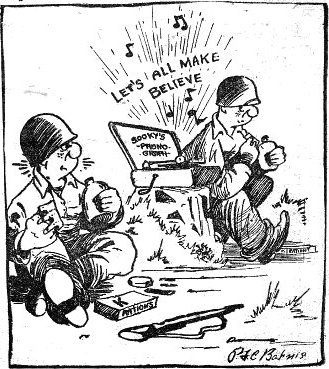
|
It also should be borne in mind that a great part of the work still ahead involves a vital duty - the evacuation of the thousands of American soldiers who have fought the bitter, unpleasant and hard war in China.
The war is over, but our work is not. It is the American way to finish the job.
Rumors, Guesses
As usual, rumors, latrinograms (among the greatest of Army sports) and just plain wild guesses are flying around madly. Your hear "right from the horse's mouth" all sorts of things.
No one can stop rumors, and, unless they are particularly vicious, there's no point in trying to, because as long as soldiers get together there will always be rumors. But no one will benefit from working himself up into a state of ecstasy over a rumor - particularly over a rumor about going home. The letdown can be heart-breaking if the rumor proves unfounded.
For instance, a lot of people have been excited over the "authoritative" report all U.S. troops must be out of the India-Burma Theater within 90 days after the war is over. It isn't true, according to ICD officials. It's just another rumor.
 The 24 officers and men were traveling under sealed orders - destination unknown. All onboard
the C-54 were vividly aware that they were leaving home, bound for distant places.
The 24 officers and men were traveling under sealed orders - destination unknown. All onboard
the C-54 were vividly aware that they were leaving home, bound for distant places.
When the prescribed time had elapsed, secret orders were opened, touching off both shouts and groans.
"I had almost forgotten - today is Sunday. What do you think of holding a little service on board?"
The captain, liking the suggestion, passed it on to the next man. After several moments of discussion and nodding of heads, the chaplain called the flight clerk and explained that the passengers would like to have both Protestant and Catholic services during the flight.
With little commotion, the Catholic officers and men gathered forward around their chaplain, who led them in prayers. Exchanging places with the Catholics, the Protestants moved forward. The chaplain read several short passages from the Old and New Testaments, and then spoke briefly from a text that seemed to be most appropriate, Psalm 139:9-10:
"If I take the wings of the morning, and dwell in the uttermost parts of the sea; even there shall thy hand lead me, and thy right hand shall hold me."
The service was concluded with the Lord's Prayer and benediction.
Everything about the service had been spontaneous. A suggestion from the chaplain had set it off, but there was already a desire for it in the hearts of the men. It was one of those rare occasions when the spirit of every worshipper was earnestly seeking for the spirit of his Maker and Redeemer.
Thus, the Lord's day was honored in a strange place and in a strange place and in a strange manner, and men beginning a long journey were reminded of the great adventure, of the pilgrimage all men make - from God unto God.
- Chaplain John K. Roberts, 1326 BU, Lalmanir Hat
Training Unit Tours India, Valley Bases
'Flying Classroom' Teaches Pilots, Mechs In Sky, On Ground
1347 BU, Shamshernagar, India - In order to bring the latest developments in maintenance and flight operations to personnel in the field, a mobile training unit is now making a tour of India and Valley bases and shortly will be operating in China.
This is one of more than 100 such units organized by the AAF Western Technical Training Command. They are veterans of more than 45,000 miles, from North Africa through Europe and as far north as Iceland and Labrador. Their job is to bring up-to-the-minute modifications, procedures and short-cuts direct from the factory and workshop to crews in distant outposts.
Men of the unit were sifted from technical training schools throughout the country. An added prerequisite was on-the-line experience. Theirs is a new kind of schooling, with cutaways, mockups and other equipment - all highly mobile - that actually shows what makes what tick and why.
The nine-man team includes Capt. Herman W. Schmeman, liaison officer; M/Sgt. Jesse Davidson, NCOIC and prop specialist; T/Sgt. David Engdahl, electrician; S/Sgt. Ambrose Walkowski, hydraulics; Sgts. Leslie Barkey, radio; Anthony Puwal, instruments and auto-pilots; Lester Elmore, oxygen and heating systems; Lawrence Crews, fuel-oil-carburetion, and Cpl. William Goan, engines.
Their classroom may be a deserted barn, a ruined chateau or a makeshift lean-to.
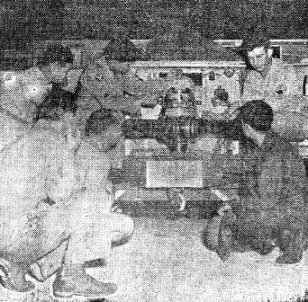 M/Sgt. Jesse W. Davidson, NCOIC and prop specialist, demonstrates how the Hamilton Hydormatic prop works.
M/Sgt. Jesse W. Davidson, NCOIC and prop specialist, demonstrates how the Hamilton Hydormatic prop works.
|
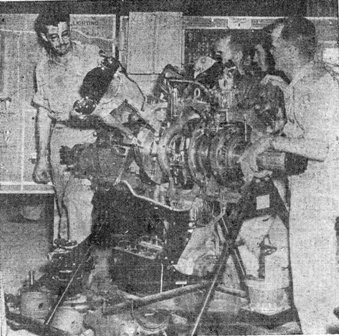 MTU stresses the importance of maintaining an integral knowledge of the power plant. Both pilots and ground men receive
instruction from Cpl. William Goan, engine specialist (second from left).
MTU stresses the importance of maintaining an integral knowledge of the power plant. Both pilots and ground men receive
instruction from Cpl. William Goan, engine specialist (second from left).
|
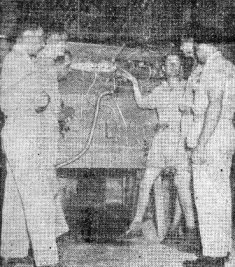 Sgt. Anthony Pawal explains how to make bellows adjustments and bleed an oil pressure transmitter.
Sgt. Anthony Pawal explains how to make bellows adjustments and bleed an oil pressure transmitter.
|
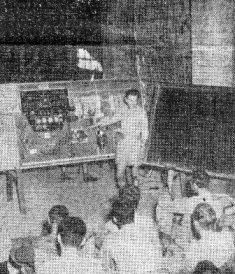 Electrical instructor T/Sgt. David Engdahl points to a magneto.
Electrical instructor T/Sgt. David Engdahl points to a magneto.
|
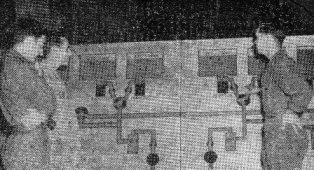 A mobile mockup board on which is laid out the complete hydraulic system of a Douglas Skymaster. Here S/Sgt. Ambrose
Walkewski traces the main power manifold.
A mobile mockup board on which is laid out the complete hydraulic system of a Douglas Skymaster. Here S/Sgt. Ambrose
Walkewski traces the main power manifold.
|
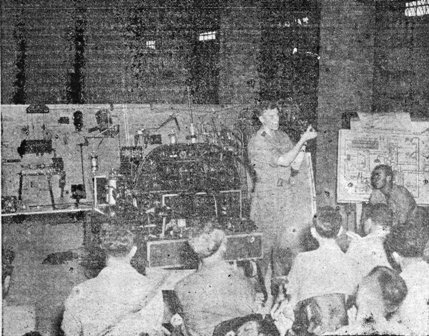 Pilots and co-pilots learn more about nose-heaters and kindred mechanisms from Sgt. Lester Elmore, specialist in oxygen
and heating systems.
Pilots and co-pilots learn more about nose-heaters and kindred mechanisms from Sgt. Lester Elmore, specialist in oxygen
and heating systems.
|
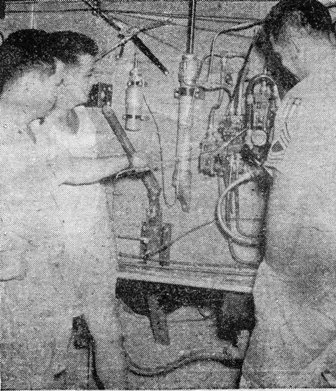 For teaching aids in fuel-oil carburetion, Sgt. Lawrence Crews (right) has elaborate diagrams. An aerial engineer and
a ground mechanic are being shown a multi-engine aircraft fuel system.
For teaching aids in fuel-oil carburetion, Sgt. Lawrence Crews (right) has elaborate diagrams. An aerial engineer and
a ground mechanic are being shown a multi-engine aircraft fuel system.
|
|
Candidates for ATC Football Team
Organize Hindu Eleven
1347 BU, Shamshernagar, India - Footbal fever hit a new high at this base when word was received that Pfc. Vernon Martin, Amarillo, Tex., All-Southwestern quarterback for the University of Texas in '41, and Lt. Beryl Clark, Cherokee, Okla., All-American mention fullback from Oklahoma University in '40, received their Stateside orders to report for tryout for the all-ATC football team no being organized in Uncle Sugar.
Eager to lose no time in training, Clark and Martin immediately organized the Shamshernagar Hump Busters, lined them up in "T" formation and got to work running plays with variations of Hindu magic.
The Hump Busters, made up of troops from the Indian labor battalion serving this base, took to the game with gusto, ran, punted, and passed the pigskin in a manner calculated to confuse the enemy and bewilder Notre Dame, the Green Bay Packers, and Texas and Oklahoma as well.
Reminiscing over old college football days, Clark and Martin discovered they had played against each other in 1939 - with Clark proudly recalling an Oklahoma victory.
Each played a season of professional football. Clark with the Chicago Cardinals and Martin with the Pittsburgh Steelers.
As the two men prepared to depart, a groan went up from the rest of the base, "Why, why, didn't I play football?"
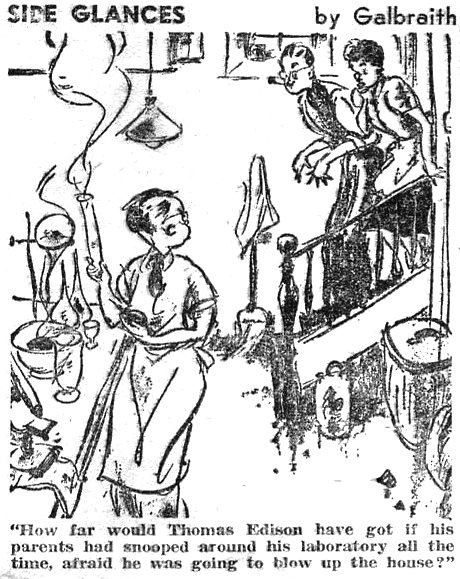
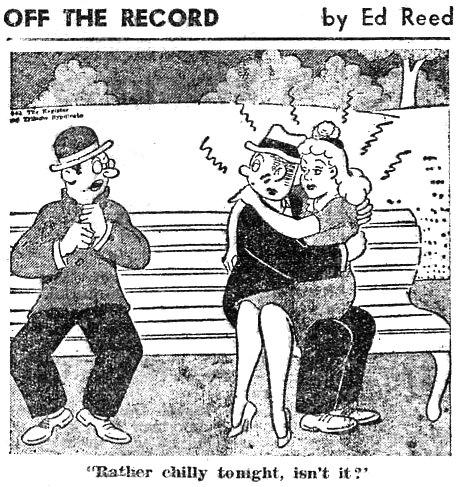
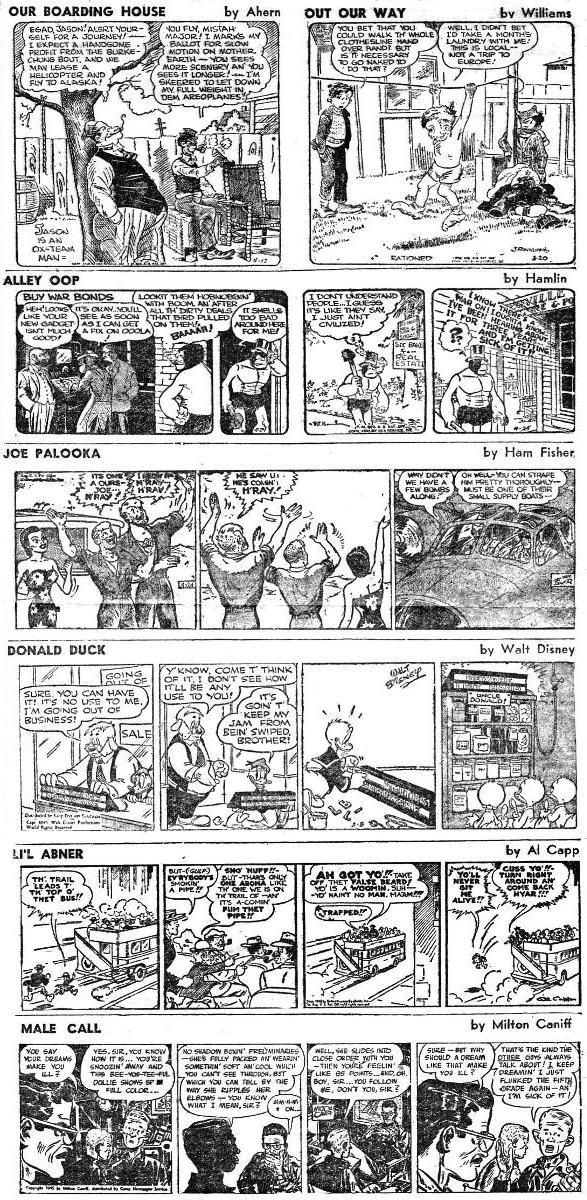
China Soldier is Stowaway on C-47 Hop
Jams self in Landing Gear, Is Hurt On Trip
1343 BU, China - When Wen Ron-Ping, Chinese soldier stationed at Lashio, Burma, decided to go home, he didn't bother with rotation, reservations, Humpco or backlogs. He merely climbed aboard a China-bound C-47 and rode - gratis.
Eager to leave Burma, Wen sold all his belongings and, with only the uniform he was wearing and his canteen, wedged himself in the landing gear assembly, just behind the main left wheel. Had he known then the painful results of a trip in the wheel nacelle or had any idea the gear retracted, Wen probably would have chosen the conventional bucket seat.
Upon the plane's arrival here, the pilot entered the pattern and lowered his gear, nearly spilling the stowaway. His luck held though, and so did the gear. It caught his hand up against the rear of the nacelle and pinned him dangling from the gear. When his plight was discovered, it was necessary to jack up the plane and unlock the gear before extrication was possible.
Wen had reached China, but he was in no condition to be happy over his homecoming. Suffering from shock, he was given a shot of morphine while being lifted out of the nacelle. His hand had been smashed to a pulp, and his shoulder wrenched. He was treated in the ATC dispensary and turned over to Chinese authorities, who are still puzzling over what to do with him.
|
500,000 Cars Predicted
For '45 Production
Flood of Steel to Permit Output of Civilian Products
Washington (ANS) - Predicting a flood of steel for consumer goods at war's end, a government official estimated Sunday that at least half a million automobiles can be built this year - twice the output previously planned.
The official said limitations on plant facilities and time needed to get production going would be the only factors restricting auto production.
First Fords
"Even so," this War Production Board authority said, "the rate of auto production early next year is expected to be at or above the prewar output of 4,000,000 cars annually."
meanwhile the first civilian passenger car produced since 1942 at Ford's Edgewater, N.J. plant was completed last Monday. The first of the 1946 models was produced July 3 at the River Rouge plant in Dearborn, Mich. The new car is powered by a V-8 engine which develops 100 horsepower, compared with the 90 of Ford's prewar engine.
Home Appliances
In Washington, A War Production Board official said steel for consumer goods would be no problem at all. He predicted that in a few months "mills will be looking for orders."
He stated that this means volume production of all consumer goods - heretofore not expected until well into 1946 - will be achieved months earlier.
The speedup will be noticeable first in small home appliances such as electric irons and toasters and later in refrigerators and washing machines.
Potsdam Ultimatum Sets Forth Points for Jap Surrender
Washington (ANS) - The Potsdam ultimatum to Japan contained the following points:
1. Elimination for all time of authority and influence of those who led Japan into her career of conquest.
2. Occupation of points in Japanese territory to be designated by the Allies until "a new order of peace and security" in the world is assured.
3. Limitation of Japanese sovereignty to the main islands of Honshu, Hokkaido, Kyushu, Shikoku and a few minor islands.
4. Carrying out the terms of the Cairo declaration which would strip Japan of all conquests.
5. Complete disarmament of the Japanese armed forces.
6. No enslavement of the Japanese nation.
7. Stern justice for war criminals.
8. Removal by the Japanese government of all obstacles to revival of democracy, freedom of speech, religion and thought.
9. Permission for Japan to retain such industries as will sustain her economy and permit reparations in kind.
10. Access for Japan to raw materials and world trade.
11. A promise to withdraw occupying Allied forces when Japan has established a peacefully inclined government "in accordance with the
freely-expressed will of the Japanese people."
Little Lady-Dogs Drive Jing Bao to Early Death
1350 BU, Kunming - Until a few weeks ago, Hostel 4 area was one of the liveliest at this base. It was the domain of Jing Bao - the fuzzy, tawny pup mascot who seemed to get a big kick out of stealing slippers, burying bones in GI's beds, and chasing around with dashing lady-dogs.
Now the area is quieter, and the fellows no longer have to worry about what they'll find in their beds at night or why their shoes become tattered and ragged so quickly. They're not happy about it, though, because Jing Bao is dead.
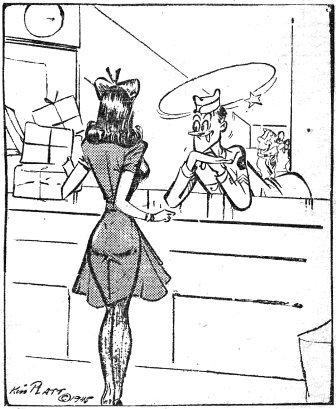 "Would you like anything else . . . merchandise, of course?"
"Would you like anything else . . . merchandise, of course?"
|
Appropriately named after that flaming drink, rice wine, a draught of which determines whether the drinker is mouse or man, Jing Bao was all dog - the nearest he could come to being all man. He considered it undignified to do tricks, and his one concession was to roll over for the price of a hamburger.
No one knows for sure the cause of the pup's death, but it's rumored that his amorous pursuits ran him ragged. One thing is certain, however, and that is that Jing Bao will not have a successor very soon. He wasn't the kind of dog easily replaced.
Plan To Strip Japs' Empire
Nips To Pay High Price For Pearl Harbor Outrage
New York (ANS) - Under the terms of the Potsdam peace formula, Japan will be stripped of the overseas empire she has won during the last 70 years and will be reduced to her four home islands "plus a few others to be designated by the Allies."
As the price she will pay for Pearl Harbor, Japan will be returned to proportions of a tight little island nation that Commodore Perry "opened" in the name of the United States government in 1853.
Japan's overseas empire stretched from the Arctic to the Tropics on Dec. 7, 1941. Japan of 1945 will measure 185,156 square miles. In that tight space there will be at least 75,000,000 people - or 500 persons per square mile.
Without an army or navy, merchant fleet or shipping fleet, and without her Asiatic mainland industries, Japan will have to absorb her people in her agrarian and small home industries.
HUMP EXPRESS is the official newspaper of the India-China Division, Air Transport Command, APO 192, c/o Postmaster, New York, N.Y., and is published by its Public Relations office. Camp Newspaper Service and Army Newspaper Service features are used, reproduction of which is prohibited without permission of CNS and ANS, 205 East 42nd St., New York, 17, N.Y. Other material is submitted by staff members, ICD-ATC base Public Relations sections and other soldier correspondents. Printed weekly by the Hindusthan Standard, 3 Burman St., Calcutta, India, and distributed each Thursday. Passed by U.S. Press Censor for mailing.
| Military transport schedules over India for cargo, personnel and mail . . . maximum tonnage of essential war materials over the Hump . . . movement of troops and supplies in support of tactical operations in China . . . evacuation of the sick and wounded - these are the missions of ICD-ATC. |

AUGUST 16, 1945
Original issue of HUMP EXPRESS shared by CBI veteran Grover P. Fike
A better quality image of the photo of Ann Sheridan was used in this recreation.
Copyright © 2008 Carl Warren Weidenburner
THE COMPLETE ORIGINAL NEWSPAPER
TOP OF PAGE PRINT THIS PAGE ABOUT THIS PAGE E-MAIL YOUR COMMENTS
PREVIOUS ISSUE HUMP EXPRESS BASE NEXT ISSUE
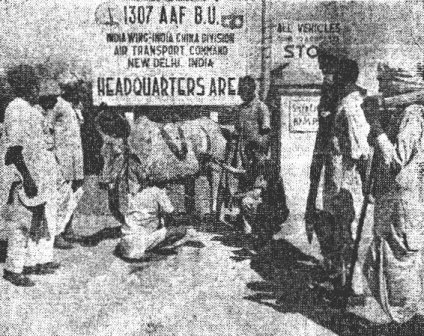 To make sure the people of Delhi would get the good news of final victory, Sgt. Leonard Dixon advertised the fact
on the side of an obliging bullock.
To make sure the people of Delhi would get the good news of final victory, Sgt. Leonard Dixon advertised the fact
on the side of an obliging bullock.
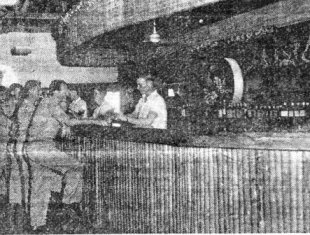 This club opened last week at Barrackpore, with a floorshow and music furnished by the 765th AAF band and pianist
Sgt. Leonard Pennario. The club has four rooms and is strictly for GIs.
This club opened last week at Barrackpore, with a floorshow and music furnished by the 765th AAF band and pianist
Sgt. Leonard Pennario. The club has four rooms and is strictly for GIs.
 Annie doesn't live here anymore but a monument still stands in Assam. She sat here long enough for the photog
to get a picture. When we look at this picture we're sorry that Annie doesn't live here anymore. But we do have a
monument in Assam.
Annie doesn't live here anymore but a monument still stands in Assam. She sat here long enough for the photog
to get a picture. When we look at this picture we're sorry that Annie doesn't live here anymore. But we do have a
monument in Assam.
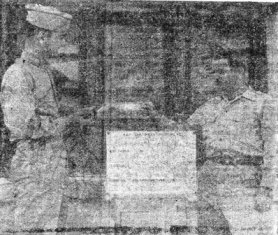 Ordered to photograph Air Force Day activities at 1338 BU, China, the picture-taker turned up with this. The
scoreboard gives the sad statistics - trips, 0; tonnage unloaded, 0. But the turnaround was
commendable - also 0.
The activities were limited to the payoff on a tonnage bet because the field was socked-in from July 31 to Aug. 2.
Lt. Charles L. Stephens, unit stat control officer, slips the bucks to Capt. Wendell Harding, P&T director.
Ordered to photograph Air Force Day activities at 1338 BU, China, the picture-taker turned up with this. The
scoreboard gives the sad statistics - trips, 0; tonnage unloaded, 0. But the turnaround was
commendable - also 0.
The activities were limited to the payoff on a tonnage bet because the field was socked-in from July 31 to Aug. 2.
Lt. Charles L. Stephens, unit stat control officer, slips the bucks to Capt. Wendell Harding, P&T director.
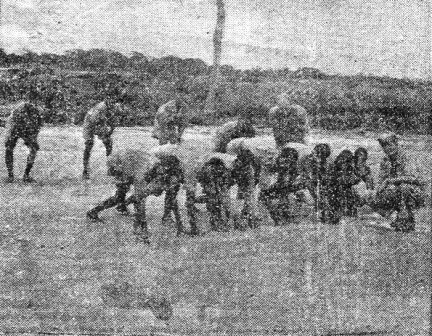 Lt. Beryl Clark and F/O Vernon Martin, tryouts for the ATC football team, coach as the Shamshernagar Hump Busters
run through their paces from a Hindu "T" formation. Is the Indian team about ready to go after Notre Dame scalps?
Lt. Beryl Clark and F/O Vernon Martin, tryouts for the ATC football team, coach as the Shamshernagar Hump Busters
run through their paces from a Hindu "T" formation. Is the Indian team about ready to go after Notre Dame scalps?
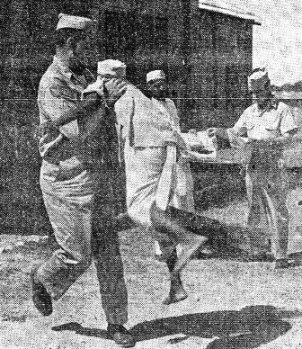 In New Delhi even the sweepers weren't safe on V-J Day. In wild exultation Sgt. Tom Glendon grabbed a sweeper
and swung him off his feet. Cpl. Wally Vespested was more interested in reading the paper.
In New Delhi even the sweepers weren't safe on V-J Day. In wild exultation Sgt. Tom Glendon grabbed a sweeper
and swung him off his feet. Cpl. Wally Vespested was more interested in reading the paper.